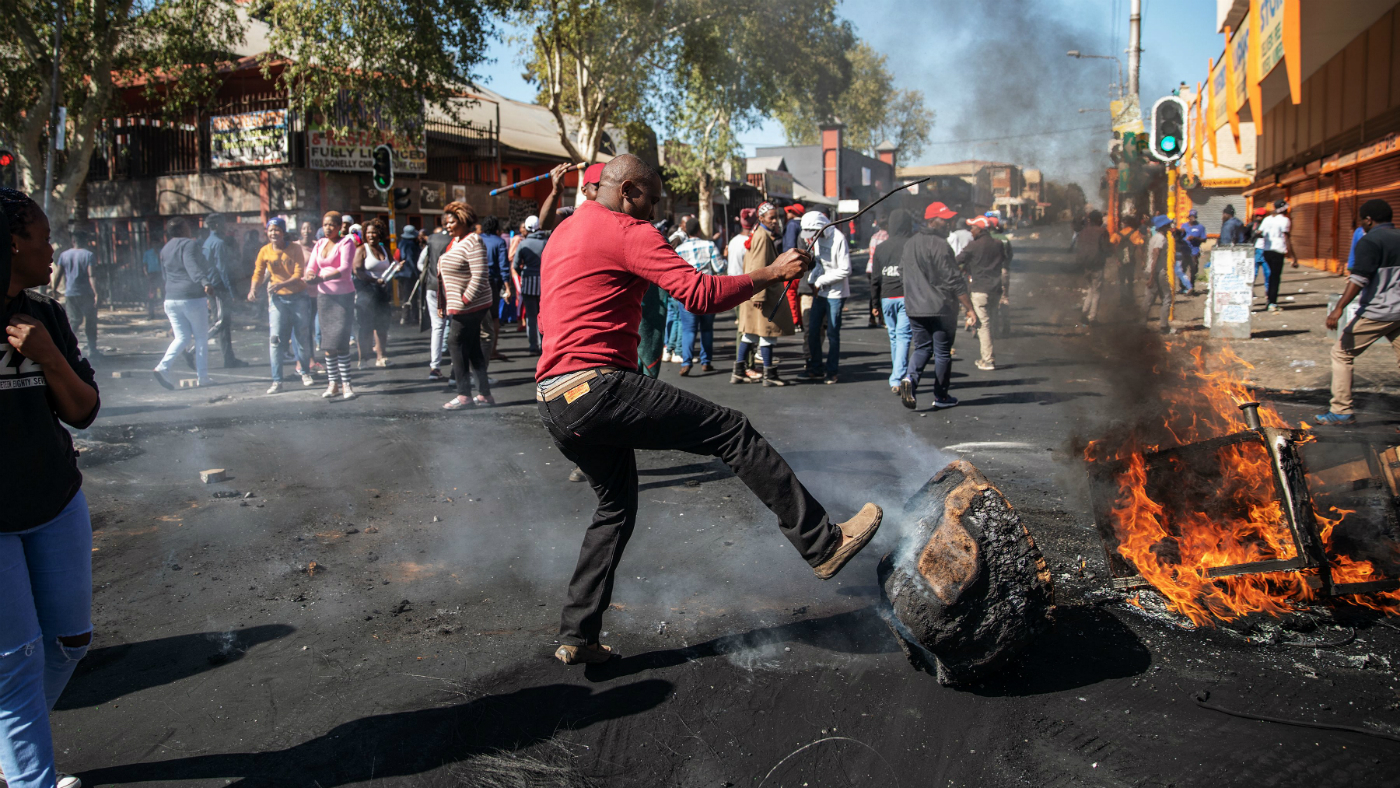South Africa shaken by xenophobic riots
President Ramaphosa condemns anti-immigrant violence that has prompted backlash across the continent

A free daily email with the biggest news stories of the day – and the best features from TheWeek.com
You are now subscribed
Your newsletter sign-up was successful
South Africa and parts of the wider African continent have been shaken by deadly violence and xenophobic attacks, which threaten to overshadow the ongoing World Economic Forum on Africa in Cape Town.
South African President Cyril Ramaphosa had reportedly hoped that the forum would “revive South Africa’s ailing economy and boost intra-African trade”, Reuters says, but a week of anti-immigrant violence, during which several people have been killed and hundreds of arrests been made, has “all but eclipsed those proceedings”.
The violence began last week when rioters in Pretoria and Johannesburg targeted immigrants from other African countries, “torching their shops and leading to at least 10 deaths”, The New York Times reports. “Now, angry citizens and governments across the continent are lashing out at South Africa and its businesses, denouncing what they call ‘xenophobia’.”
The Week
Escape your echo chamber. Get the facts behind the news, plus analysis from multiple perspectives.

Sign up for The Week's Free Newsletters
From our morning news briefing to a weekly Good News Newsletter, get the best of The Week delivered directly to your inbox.
From our morning news briefing to a weekly Good News Newsletter, get the best of The Week delivered directly to your inbox.
“Our country has been deeply traumatized ...by acts of violence and criminality,” Ramaphosa said in a televised address. “There can be no excuse for attacks on homes and businesses of foreign nationals ... [or] xenophobia.”
Why are South Africans turning on other Africans?
According to the New York Times, anti-immigrant sentiment is a “longstanding issue” in South Africa, where the “legacies of colonialism and apartheid run deep, and a political shift has not delivered meaningful change to many poor South Africans”.
As a result of this, immigrants from countries such as Nigeria, Mozambique, Somalia and Zimbabwe are “often regarded by South Africans as competitors for jobs and social services”.
A free daily email with the biggest news stories of the day – and the best features from TheWeek.com
South Africa’s foreign minister Naledi Pandor has admitted the existence of systemic “Afrophobia”, a resentment of other Africans living and working in the country, Reuters reports.
The slumping economy, which has left almost one-third of South Africans out of work, has increased the rate of attacks on foreigners in South Africa over recent years.
However, they spiked dramatically last Sunday when rioters in Johannesburg targeted shops owned by immigrants. Bloomberg reports that this was in response to the shooting of a South African taxi driver allegedly by a Nigerian drug dealer, although this has not been verified.
At least ten people have been killed in the flare-up of violence so far. Police have arrested at least 423 people in and around Johannesburg in connection with xenophobic disorder.
What has the response been?
Under intense scrutiny from other African leaders, Ramaphosa has been quick to condemn the violence.
Nigeria, which believes that a number of its citizens have been killed in the violence, has already reacted strongly, electing to boycott the World Economic Forum and recalling its ambassador to South Africa.
Nigerian foreign minister Geoffrey Onyeama said in a statement: “The government believes that we have to take the moral high ground on this matter.”
The president has also sent an envoy to South Africa to “express Nigeria’s displeasure over the treatment of her citizens”, he added. In response, South Africa has severed many of its diplomatic ties with Nigeria.
The response on the streets of Nigeria has been just as fierce. On Tuesday and Wednesday, South African-owned businesses in the capital Abuja and the largest city Lagos were targeted by protesters, who started fires and looted multiple properties.
The unrest has also touched the country’s elite, with two popular Nigerian musicians, Burna Boy and Tiwa Savage, announcing that they were boycotting South Africa.
It appears that much of Africa has taken the side of Nigeria on the issue, with demonstrators in the Democratic Republic of Congo’s second city, Lubumbashi, breaking the windows of South Africa’s consulate, while Air Tanzania has suspended flights to Johannesburg because of the violence.
Furthermore, both the Zambia and Madagascar football federations announced that they will not be sending a team to play South Africa, citing security concerns.
Ramaphosa has called for calm, writing on Twitter that: “The people of our country want to live in harmony. Whatever grievance and concerns people have, we need to handle it in a democratic way.”